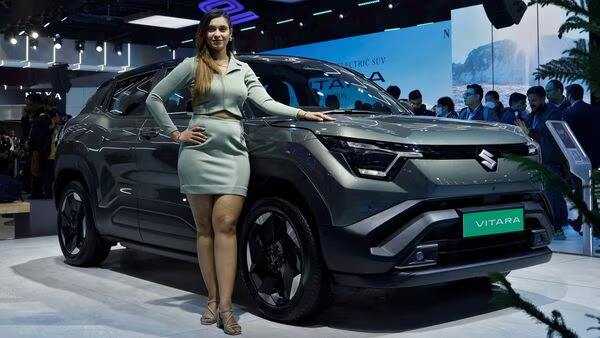The Maruti Suzuki e-Vitara rare earths crisis has forced India’s largest automaker to significantly reduce near-term production of its first electric vehicle (EV), the e-Vitara. This production cut stems from a global shortage of rare earth materials, a critical component in electric vehicle manufacturing. The e-Vitara’s production is now scaled back by nearly two-thirds due to supply chain disruptions arising from China’s export restrictions.
Production Cuts and Revised Targets
Maruti Suzuki now plans to produce only about 8,200 e-Vitaras between April and September 2025, compared to an initial target of 26,500 units. However, the company aims to meet its full-year production target of 67,000 EVs by March 2026. A key component of their plan involves ramping up production to approximately 58,700 units between October 2025 and March 2026.
Impact on Maruti Suzuki and Indian EV Market
This Maruti Suzuki e-Vitara rare earths crisis is a significant setback, particularly as the company aims to compete with Tata Motors and Mahindra & Mahindra in the fast-growing EV market. The delay in e-Vitara production can also affect export timelines and Suzuki’s broader global strategy, as India is an important production hub.
Industry-Wide Implications of the Rare Earths Crisis
The global rare earths shortage, which is the cause of the Maruti Suzuki e-Vitara rare earths crisis, poses a risk to India’s entire EV sector. With permanent magnet synchronous motors (PMSMs) used in most electric vehicles depending on rare earth magnets, sustained shortages could lead to production delays, launch postponements, and supply chain challenges across the industry.
Response and Adaptation
Despite the challenges, Maruti Suzuki is working to minimize the impact of the Maruti Suzuki e-Vitara rare earths crisis. The automaker is banking on improved supply chain conditions and exploring alternative rare earth sources to meet its long-term production goals. Long-term plans involve diversification of sourcing, building strategic reserves, and boosting domestic production and recycling of rare earths.
Expert Analysis
According to industry analyst Rajan Patel, “The Maruti Suzuki e-Vitara rare earths crisis underscores the urgent need for Indian automakers to develop a more resilient and diversified supply chain. Addressing the long-term risks from global supply chain disruptions will also mean a strategic response to the rare earths crisis.”
Future Outlook
If the global rare earths supply remains constrained, the Indian EV market may experience slower growth. Production delays can impact various vehicles across both passenger and two-wheeler segments. Overcoming the Maruti Suzuki e-Vitara rare earths crisis is a key challenge as the company is about to face competition from new entrants such as Tesla.












](https://i0.wp.com/nirbhidjanmat.com/wp-content/uploads/2025/06/SJaishankar.jpg?resize=75%2C75&ssl=1)



























](https://i0.wp.com/nirbhidjanmat.com/wp-content/uploads/2025/06/SJaishankar.jpg?resize=360%2C180&ssl=1)











